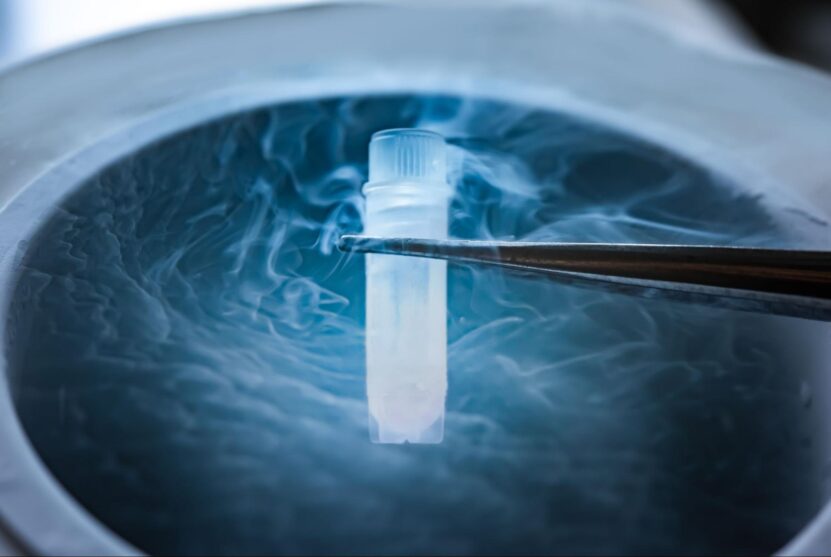October 15, 2024
How Long Can an Embryo Be Frozen?

Advances in reproductive technology have made it possible for people to freeze embryos for future use, offering flexibility and hope for those planning their families. A common question for individuals and couples considering embryo freezing is: How long can an embryo be frozen? Surprisingly, embryos can remain viable for decades if stored correctly. This blog explores the science behind embryo freezing, the longevity of frozen embryos, and the considerations for using frozen embryos in the future.
The Science Behind Embryo Freezing
Embryo freezing, also known as cryopreservation, is a process where embryos are preserved at extremely low temperatures, usually around -196°C, in liquid nitrogen. The freezing process halts all biological activity, essentially putting the embryo in a state of suspended animation. This means that time effectively stops for the embryo while it is frozen, preventing cell degradation and maintaining its viability for future use.
There are two primary methods for freezing embryos:
1. Slow Freezing: This older method gradually lowers the temperature, allowing ice crystals to form within the cells, which can sometimes damage them.This is generally not used anymore.
2. Vitrification: A modern and more effective technique, vitrification involves a rapid freezing process that prevents ice crystals from forming, significantly reducing the risk of cellular damage. Vitrification has improved the survival rates of embryos after thawing.
How Long Can Embryos Be Frozen?
There is no set expiration date for frozen embryos. Research has shown that embryos can be frozen for decades without compromising viability. Successful pregnancies have been achieved with embryos that have been frozen for over 20 years. This longevity makes embryo freezing a highly attractive option for people looking to preserve their fertility for various reasons, including:
- Medical treatments: Individuals undergoing chemotherapy or other treatments that may affect fertility.
- Family planning: Couples or individuals who want to delay childbearing for personal or professional reasons.
- IVF cycles: Couples who undergo in vitro fertilization (IVF) and have extra embryos may freeze them for future attempts.
There is no technical limit on how long an embryo can be stored. This mostly depends on the age of patients and their desires for future children.
Factors Affecting Embryo Longevity
Even though embryos can be frozen indefinitely, certain factors can influence the decision to keep them in storage or use them at a later date.
1. Embryo Quality
The quality of the embryo at the time of freezing is crucial. High-quality embryos are more likely to survive the freezing and thawing process and result in successful pregnancies. Embryo grading is a process used by fertility specialists to assess the health of an embryo before it is frozen, looking at factors such as cell division and structure. Good quality embryos at out IVF center have >98% probability of surviving the thaw
2. Storage Conditions
Embryos must be stored in specialized facilities that maintain consistent temperatures and monitor conditions closely. Any fluctuation in storage temperature or failure in the equipment could compromise the embryos’ viability. However, with modern cryopreservation technology and careful monitoring, the risk of storage failures is extremely low.
3. Legal and Ethical Considerations
Some regions have legal limits on how long embryos can be stored. Additionally, couples or individuals may face ethical questions about what to do with unused frozen embryos. Some options include:
- Using them for future pregnancies
- Donating them to other individuals or couples
- Donating them for research
- Disposing of them
These decisions can be complex and personal, and counseling may benefit individuals facing them.
What Happens When Frozen Embryos Are Thawed?
Thawing a frozen embryo is a delicate process. Once an embryo is removed from storage, it must be gradually brought to room temperature. Fertility specialists use a series of carefully timed steps to remove the protective substances used during freezing and rehydrate the cells. The vitrification method has significantly improved survival rates, with about 90-95% of embryos surviving the thawing process and even higher chances with good embryo quality..
Once thawed, embryos can be transferred into the uterus during a frozen embryo transfer (FET) cycle. The success rates of FETs are higher than fresh embryo transfers, meaning that freezing and thawing the embryos does not seem to diminish the chances of pregnancy.
Success Stories of Long-Frozen Embryos
Over the years, there have been remarkable cases of successful pregnancies with embryos that had been frozen for decades. One notable case occurred in 2020 when a woman gave birth to a healthy baby from an embryo that had been frozen for 27 years. This shows that even long-frozen embryos have the potential to result in healthy pregnancies, provided they are stored and handled properly.
Is There a Downside to Long-Term Freezing?
While embryos can remain viable for decades, there are a few considerations to keep in mind:
1. Storage Costs: Long-term storage can be expensive. Many fertility clinics charge annual fees for embryo storage, which can add up over time.
2. Emotional Considerations: Some couples or individuals may feel uncertain about what to do with embryos they no longer plan to use. This can lead to difficult decisions down the line.
3. Advancements in Technology: As reproductive technology continues to evolve, some individuals may wonder if frozen embryos from past cycles are still the best option, or if they would benefit from newer IVF technologies.
Embryo freezing is a powerful tool for preserving fertility, and modern cryopreservation techniques ensure that embryos can be stored for many years without compromising their viability. Although embryos can be frozen indefinitely, deciding when to use them—or whether to use them at all—is deeply personal. Whether you’re considering embryo freezing for medical reasons, family planning, or fertility preservation, the reassurance that embryos can remain viable for decades offers flexibility and hope for the future.
If you have questions about embryo freezing, storage options, or the process of thawing and transferring frozen embryos, Island Reproductive Services is here to provide expert guidance and support through every step of your fertility journey.


